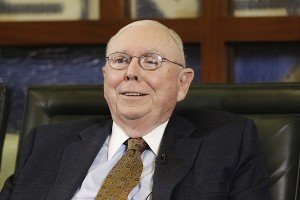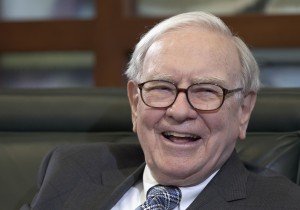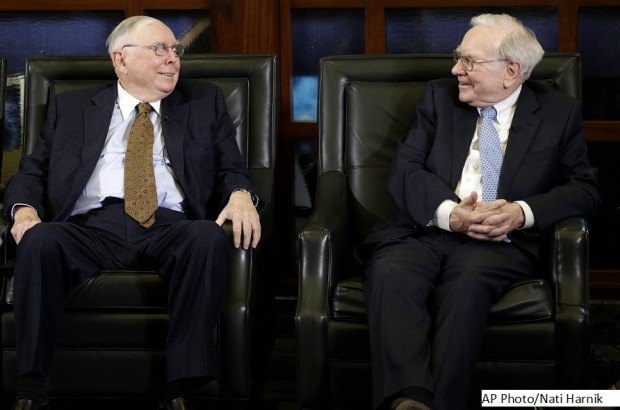The Berkshire Hathaway 2014 Annual Report includes discussions from Chair Warren Buffett and Vice Chair Charlie Munger about leadership and success in the insurance business.
Some excerpts follow.
Munger: A Short History of Success
” …in the early decades of the Buffett era, common stocks within Berkshire’s insurance subsidiaries greatly outperformed the index, exactly as Buffett expected. And, later, when both the large size of Berkshire’s stockholdings and income tax considerations caused the index-beating part of returns to fade to insignificance (perhaps not forever), other and better advantage came.

(AP Photo/Nati Harnik)
“Ajit Jain created out of nothing an immense reinsurance business that produced both a huge “float” and a large underwriting gain. And all of GEICO came into Berkshire, followed by a quadrupling of GEICO’s market share.
“And the rest of Berkshire’s insurance operations hugely improved, largely by dint of reputational advantage, underwriting discipline, finding and staying within good niches, and recruiting and holding outstanding people.”
Munger on Succession
“Provided that most of the Berkshire system remains in place, the combined momentum and opportunity now present is so great that Berkshire would almost surely remain a better-than-normal company for a very long time even if (1) Buffett left tomorrow, (2) his successors were persons of only moderate ability, and (3) Berkshire never again purchased a large business.
“But, under this Buffett-soon-leaves assumption, his successors would not be ‘of only moderate ability.’ For instance, Ajit Jain and Greg Abel are proven performers who would probably be under-described as ‘world-class.’
“‘World-leading’ would be the description I would choose. In some important ways, each is a better business executive than Buffett. And I believe neither Jain nor Abel would (1) leave Berkshire, no matter what someone else offered or (2) desire much change in the Berkshire system.”
Buffett on Being Prepared
“We will always be prepared for the thousand-year flood; in fact, if it occurs we will be selling life jackets to the unprepared. Berkshire played an important role as a “first responder” during the 2008-2009 meltdown, and we have since more than doubled the strength of our balance sheet and our earnings potential. Your company is the Gibraltar of American business and will remain so….”

(AP Photo/Nati Harnik, File)
“At a healthy business, cash is sometimes thought of as something to be minimized— as an unproductive asset that acts as a drag on such markers as return on equity. Cash, though, is to a business as oxygen is to an individual: never thought about when it is present, the only thing in mind when it is absent.”
Buffett on Governance
“…unlike almost all other sizable public companies, we carry no directors and officers liability insurance. At Berkshire, directors walk in your shoes….”
Buffett on Leadership
“Managing Berkshire is primarily a job of capital allocation, coupled with the selection and retention of outstanding managers to captain our operating subsidiaries. Obviously, the job also requires the replacement of a subsidiary’s CEO when that is called for. These duties require Berkshire’s CEO to be a rational, calm and decisive individual who has a broad understanding of business and good insights into human behavior. It’s important as well that he knows his limits. (As Tom Watson, Sr. of IBM said, “I’m no genius, but I’m smart in spots and I stay around those spots.”)
“Character is crucial: A Berkshire CEO must be “all in” for the company, not for himself. (I’m using male pronouns to avoid awkward wording, but gender should never decide who becomes CEO.)”





















 Focus on Ski Guides After Deadly California Avalanche Could Lead to Criminal Charges, Civil Suits
Focus on Ski Guides After Deadly California Avalanche Could Lead to Criminal Charges, Civil Suits  Teens’ First Year on the Road Most Deadly
Teens’ First Year on the Road Most Deadly  Large Scale Cargo Ring Busted in LA, $5M Recovered
Large Scale Cargo Ring Busted in LA, $5M Recovered  10 Do’s and Don’ts of a Smart ORSA Report
10 Do’s and Don’ts of a Smart ORSA Report 










